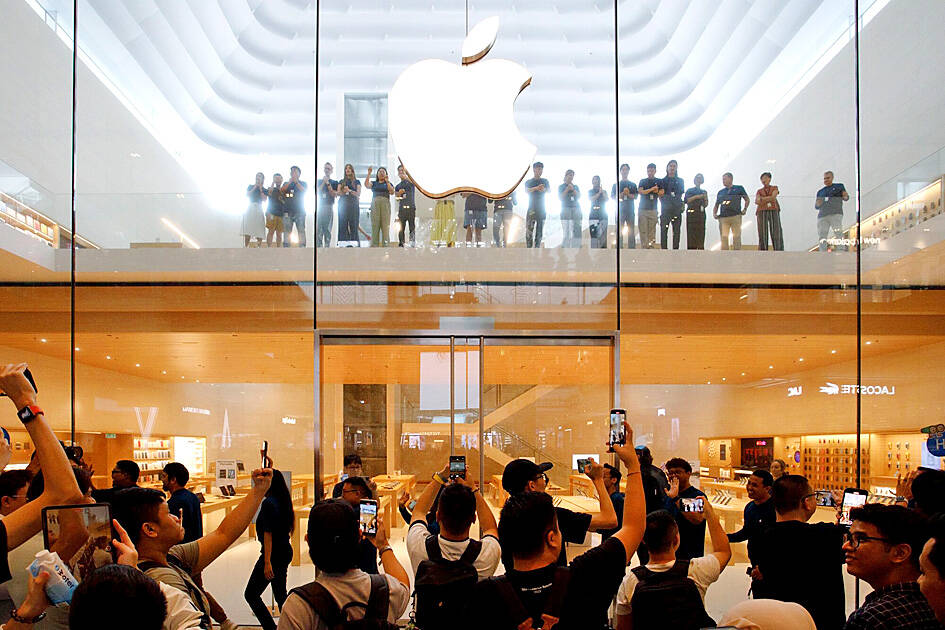Apple Inc on Friday said it would delay the rollout of its recently announced artificial intelligence (AI) features in Europe, because of “regulatory uncertainties” linked to the EU’s new landmark legislation to curb the power of big tech.
“We do not believe that we will be able to roll out these features to our EU users this year,” an Apple spokesperson said, citing the EU’s Digital Markets Act (DMA).
Apple earlier this month unveiled “Apple Intelligence,” its suite of AI features for its coveted devices, as it looks to reassure users that it is not falling behind on the AI frenzy.

Photo: Bloomberg
The announcement included a partnership with OpenAI that would make ChatGPT available to iPhone users on request. Meanwhile, the company is talking to Meta Platforms Inc about integrating the Facebook parent company's generative AI into its products, the Wall Street Journal reported yesterday.
Apple said the feature, as well as its iPhone AirPlay and SharePlay screen sharing enhancements, were put on hold over concern “that the interoperability requirements of the DMA could force us to compromise the integrity of our products in ways that risk user privacy and data security.”
Apple Intelligence, which runs only on the company’s in-house technology, would enable users to create their own emojis based on a description in everyday language, or to generate brief summaries of emails in the mailbox.
“We are committed to collaborating with the European Commission in an attempt to find a solution that would enable us to deliver these features to our EU customers without compromising their safety,” the company said.
In an effort to instill fair competition in Europe, the DMA sets out a list of dos and don’ts for the specially designated Internet gatekeepers that include Apple.
“The EU is an attractive market of 450 million potential users, and has always been open for business for any company that wants to provide services in the European internal market,” an EU spokesperson said.
“Gatekeepers are welcome to offer their services in Europe, provided that they comply with our rules aimed at ensuring fair competition,” the EU added.
EU Commissioner for Competition Margrethe Vestager on Tuesday said Apple was falling short in abiding by the DMA, as the bloc carries out a probe over Apple’s business practices.
“We have a number of Apple issues; I find them very serious. I was very surprised that we would have such suspicions of Apple being non-compliant,” Vestager told CNBC.
Her comments came after the Financial Times reported that Apple was about to face charges in relation to the probe, citing people close to the probe.
The DMA empowers the European Commission to investigate, fine and impose structural remedies on noncompliant gatekeepers. Penalties can reach up to 10 percent of global annual turnover, with repeat offenders facing up to 20 percent.

DIVIDED VIEWS: Although the Fed agreed on holding rates steady, some officials see no rate cuts for this year, while 10 policymakers foresee two or more cuts There are a lot of unknowns about the outlook for the economy and interest rates, but US Federal Reserve Chair Jerome Powell signaled at least one thing seems certain: Higher prices are coming. Fed policymakers voted unanimously to hold interest rates steady at a range of 4.25 percent to 4.50 percent for a fourth straight meeting on Wednesday, as they await clarity on whether tariffs would leave a one-time or more lasting mark on inflation. Powell said it is still unclear how much of the bill would fall on the shoulders of consumers, but he expects to learn more about tariffs

NOT JUSTIFIED: The bank’s governor said there would only be a rate cut if inflation falls below 1.5% and economic conditions deteriorate, which have not been detected The central bank yesterday kept its key interest rates unchanged for a fifth consecutive quarter, aligning with market expectations, while slightly lowering its inflation outlook amid signs of cooling price pressures. The move came after the US Federal Reserve held rates steady overnight, despite pressure from US President Donald Trump to cut borrowing costs. Central bank board members unanimously voted to maintain the discount rate at 2 percent, the secured loan rate at 2.375 percent and the overnight lending rate at 4.25 percent. “We consider the policy decision appropriate, although it suggests tightening leaning after factoring in slackening inflation and stable GDP growth,”

Meta Platforms Inc offered US$100 million bonuses to OpenAI employees in an unsuccessful bid to poach the ChatGPT maker’s talent and strengthen its own generative artificial intelligence (AI) teams, OpenAI CEO Sam Altman has said. Facebook’s parent company — a competitor of OpenAI — also offered “giant” annual salaries exceeding US$100 million to OpenAI staffers, Altman said in an interview on the Uncapped with Jack Altman podcast released on Tuesday. “It is crazy,” Sam Altman told his brother Jack in the interview. “I’m really happy that at least so far none of our best people have decided to take them

As they zigzagged from one machine to another in the searing African sun, the workers were covered in black soot. However, the charcoal they were making is known as “green,” and backers hope it can save impoverished Chad from rampant deforestation. Chad, a vast, landlocked country of 19 million people perched at the crossroads of north and central Africa, is steadily turning to desert. It has lost more than 90 percent of its forest cover since the 1970s, hit by climate change and overexploitation of trees for household uses such as cooking, officials say. “Green charcoal” aims to protect what